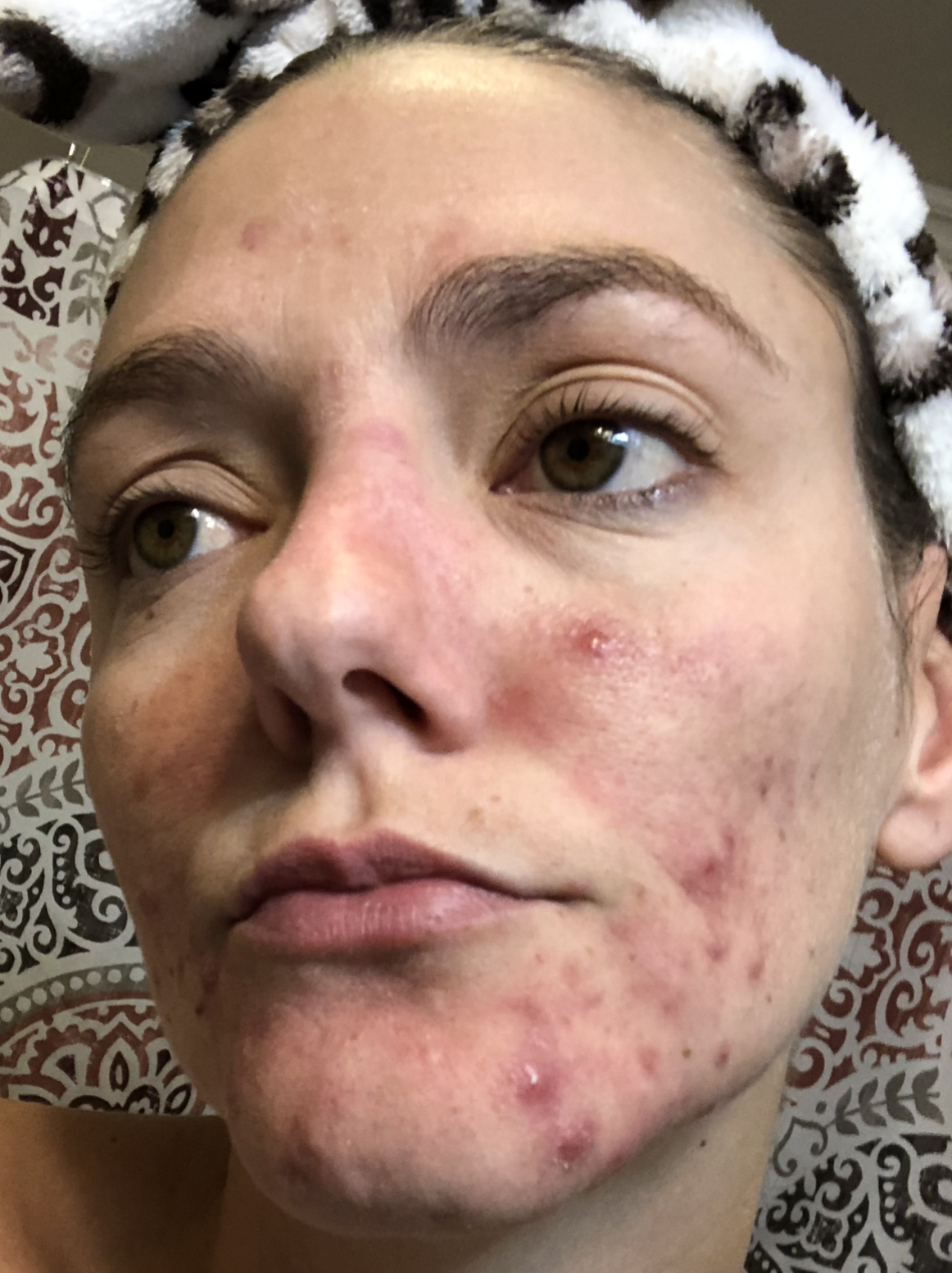The Cortisol-Skin Connection: Why Stress Causes Breakouts
Anxiety and I go way back. I’ve joked that I came out of the womb with it, and honestly, it’s shaped so much of how my nervous system operates. But if I had to pinpoint a time when it all really peaked, it would be the stretch from 2020 to 2025.
The Years My Skin Remembers
Grief hit hard in 2020, and looking back, I can see how I threw myself into growing my business as a way to cope. In June 2021, I opened my skin studio. Right away, things got busy. In September, a power outage caused by Hurricane Ida and a case of COVID had me out of work for about 3 weeks. After that, it felt like I was always playing catch-up. Working every day of the week, trying to keep up with clients, but never quite getting there.
Skin By Liv Skincare Studio
The busier I got, the more I poured myself into work. Eventually, I had employees, then renters, and my business became all-consuming. By 2023, I was completely burnt out. I started to lose my spark for the work I once loved. I tried to make changes to reconnect with my purpose and lighten my load, but even as I made those shifts, my skin became the messenger, showing me that something inside was still out of sync.
When I look back at photos from five years ago, I can see the difference in my skin. Sure, some of it is just natural aging, but there’s no denying the toll that grief, stress, and anxiety have taken. My skin has shown it all—cystic breakouts, inflammation, a weakened barrier, lines, and that tired, dull look that’s hard to miss. It’s obvious my skin has been carrying the weight of everything my body and mind have been through.
That’s a big part of why I chose to focus on internal transformation. Once I understood how deeply stress affects the skin, it was as if all the puzzle pieces fit together. I realized that if I healed the impact of the last few years on my body, mind, and spirit, my skin would reflect that healing too.
The interesting thing is, I made this connection some time ago and even tried different ways to manage my stress. But it’s only now that I’m truly committing to being CONSISTENT with it. To really support my nervous system so I’m not stuck in that fight, flight, or freeze mode all the time.
Before I share what I’m doing, I want to walk you through not just how stress affects your skin, but the ways it actually shows up on your face.
The Cortisol Cascade
Anytime we’re under stress, the body releases the stress hormone, cortisol, which I talked a little deeper about in my last post about caffeine and skin. When chronic stress occurs, consistently elevated cortisol levels set off a series of unfortunate events. All of these events ultimately lead to overactive oil glands, a weakened skin barrier, slower wound healing, and inflammation.
When Stress Becomes Visible
Now that’s not where it ends. All of these things will lead to the different ways that stress can manifest on your skin.
Acne: When oil production and inflammation increase and your skin barrier can’t protect from outside bacteria, that’s when we see acne form on the skin. Cystic acne is often attributed to stress because of the inflammatory factor.
Accelerated Aging: not only do elevated cortisol levels contribute to diminished collagen production, but increased inflammation will often cause oxidative stress in the body, which damages cells, including skin cells. Once the skin cells are damaged, that’s when we start to see those signs of aging.
Dryness and Dullness: a weakened skin barrier, whose main function is to help the skin retain moisture, will obviously lead to dryness and a dull complexion.
Eczema, Psoriasis, and Rosacea: if you suffer from any of these inflammatory conditions, stress can lead to a flare-up because of the increase in inflammation caused by elevated cortisol.
Committing to Consistency
So knowing all of this, here’s what’s different now. I’m not just trying random stress-management techniques and hoping they stick. I’m approaching this the same way I approach skin: with intention, consistency, and an understanding that healing takes time. I’m using techniques that I’ve tried and experienced before, but I’m actually committing to a routine. Here’s what I’m actually doing…
Daily Meditation: I’m making a 10-minute meditation part of my morning routine. Meditation calms the mind, and when done consistently, can have profound, positive effects on stress and stress-related issues.
Daily Movement: Movement boosts the release of endorphins, the happy hormone, and lowers cortisol. I’ve already, over the last 6 months, successfully made daily movement a part of my day at least 5 days a week, but moving forward, I’m making a promise to myself to move DAILY.
Prioritize Sleep: Like movement, I’ve already started to prioritize my sleep. I have a few more things to work on, like setting boundaries with screens before bed, but I’m determined to make sleep a top priority because quality sleep really is vital for mental health.
Eliminating Caffeine: Like I talked about in my last post, caffeine has proven to be a major trigger for my anxiety and my acne breakouts. I’ve made the swap to decaf coffee, and I’m limiting myself to one Diet Coke a week for now.
Journaling: Honestly, one of the most therapeutic practices for me is writing. Sometimes, just getting it out of my head and on paper can be enough to help me sort through stressful situations or emotions; other times, it requires another breathing person, but for the most part, journaling has been beneficial for my mindset, so I’m making it a daily practice moving forward.
Here’s the thing, I’m not telling you this because I’ve figured it all out or because I’m living some zen, stress-free life now. But I have found practices that actually make a difference, and more importantly, showing up for them consistently could only have positive repercussions.
Showing Up Imperfectly
I know it won’t be perfect, but that’s not the point. The point is that I’ve made a promise to myself to grow, to improve, to thrive. And this time, I’m keeping that promise.
If you’re on a similar journey, I invite you to join me. Commit to one new habit, share your experience, or simply take the first step with me. Let’s support each other and see how consistency can change us from the inside out.




